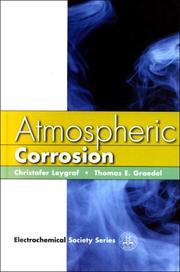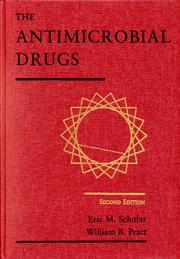| Listing 1 - 10 of 262 | << page >> |
Sort by
|
Book
Abstract | Keywords | Export | Availability | Bookmark
 Loading...
Loading...Choose an application
- Reference Manager
- EndNote
- RefWorks (Direct export to RefWorks)

ISBN: 0471372196 Year: 2000 Publisher: New York Wiley-Interscience
Abstract | Keywords | Export | Availability | Bookmark
 Loading...
Loading...Choose an application
- Reference Manager
- EndNote
- RefWorks (Direct export to RefWorks)
Book
Year: 2000 Publisher: Berlin ; Heidelberg ; new York Springer Verlag
Abstract | Keywords | Export | Availability | Bookmark
 Loading...
Loading...Choose an application
- Reference Manager
- EndNote
- RefWorks (Direct export to RefWorks)

ISBN: 128083093X 0199759715 9780199759712 0195125282 9780195125283 0195125290 9780195125290 9780195340235 019534023X Year: 2000 Publisher: Oxford New York Oxford University Press
Abstract | Keywords | Export | Availability | Bookmark
 Loading...
Loading...Choose an application
- Reference Manager
- EndNote
- RefWorks (Direct export to RefWorks)
Communicable Diseases --- Anti-Infective Agents. --- Anti-Microbial Agents --- Antiinfective Agents --- Antimicrobial Agents --- Anti-Infective Agent --- Anti-Microbial Agent --- Antimicrobial Agent --- Microbicide --- Microbicides --- Agent, Anti-Infective --- Agent, Anti-Microbial --- Agent, Antimicrobial --- Agents, Anti-Infective --- Agents, Anti-Microbial --- Agents, Antiinfective --- Agents, Antimicrobial --- Anti Infective Agent --- Anti Infective Agents --- Anti Microbial Agent --- Anti Microbial Agents --- Infections --- Parasites --- drug therapy. --- Anti-infective agents. --- Communicable diseases --- Chemotherapy.
Book
Year: 2000 Publisher: Bruxelles: UCL,
Abstract | Keywords | Export | Availability | Bookmark
 Loading...
Loading...Choose an application
- Reference Manager
- EndNote
- RefWorks (Direct export to RefWorks)
The MLH1 gene codes a protein involved in the DNA Mismatch Repair system (MMR). The MMR system plays an essential role in the control of the fidelity of replication. Misfunction of the MLH1 protein, and thus of the MMR system, is characterised by microsatellite instability in the tumour DNA (MSI+phenotype). The presence of MSI is classically observed in 90% if the tumours associated with Lynch syndrome, also called Hereditary Non Polyposis Colorectal Cancer (HNPCC) is one of the most common genetic disease in the Western world and accounts for 15% of all colon cancers. This predisposition is generally caused by germline mutations in the MLH1 gene. Sporadic MSI+ tumours results in the most of the cases of epigenetic inactivation of the MLH1 gene by bi-allelic methylation in the promoter region.
The aim of this study is to access the role of the MLH1 gene in the colorectal cancers of the 22 patients selected on the base of the molecular and immunohistochemical tests from a group of 250 tumours analysed at the Centre for human genetics of UCL- Cliniques Universitaires St-Luc (September 1998 to January 2000). MSI is observed in the tumours of the 22 patients, due to a defective MMR system. The loss of MLH1 protein at tumour level is shown for 18 patients and oriented the search for mutations to the MLH1 gene.
Pathogenic germline mutations are identified by Denaturing Gradient Gel Electrophoresis (DGGE). In total, 8 of the 22 patients (36%) carried a germline mutation, which confirmed the diagnosis of a hereditary deficiency of the MLH1 gene. Methylation status of the promoter region of the MLH1 gene is determined by the sensitivity of the restriction enzyme HpaII. Methylation of both alleles of the MMLH1 promoter associated with the absence of a germline mutation was observed in 4 patients. This epigenetic inactivation of the MLH1 gene pleads rather for a sporadic colorectal cancer. Therefore, for each patient the age at diagnosis and the family history are gathered. These data are correlated with the molecular results to determine the best predictive parameters in order to distinguish easily the mutation carriers from the sporadic cases. The study of the Methylation profile and the family analysis proved to be useful to predict the presence or not of a germline mutation. On the other hand, the age at diagnosis didn’t seem a good predictive factor of mutation Le gène MLH1 code pour une protéine du Système de Réparation des Mésappariements de l’ADN (SRM). Le SRM joue un rôle primordial dans le contrôle de la fidélité de la réplication, mais également en pathologie humaine dans la carcinogenèse colique. Une perte de fonction de la protéine MLH1, et donc du SRM, se caractérise selon le modèle des gènes suppresseurs de tumeur par une instabilité des microsatellites au niveau tumorale (MSI+). La phénotype MSI+ est observé dans 90% des tumeurs du côlon héréditaires (syndrome de Lynch) (OMIM 120436), mais également dans 13% des cancers sporadiques (Kinzler et Vogelstein, 1996). Si l’inactivation mutationnelle du gène MLH1 est associée à une prédisposition héréditaire au cancer du côlon transmise selon le mode autosomique dominant, l’hyperméthylation bi-allélique des régions promotrices du gène MLH1 permet de rendre compte de la majorité des cancers sporadiques (Herman et al, 1998). L’objectif de ce mémoire est de caractériser le rôle du gène MLH1 dans la cancer du côlon de 22 patients sélectionnés sur base moléculaire et immunohistochimique à partir d’une cohorte de 250 tumeurs colorectales étudiées au Centre de génétique humaine de l’UCL – Cliniques Universitaire Saint-Luc (septembre 1998 à janvier 2000). Le déficit du SRM est présent chez tous sous la forme de tumeurs MSI+. Une absence d’expression de la protéine MLH1 est observée chez 18 d’entre eux.
L’identification de mutations germinales délétères dans le gène MLH1 est réalisée par la technique d’électrophorèse sur gel en gradient de dénaturant (DGCE) suivie de séquençage. Au total, 8 patients sur 22 (36%) se sont révélés être porteurs de mutation, confirmant le diagnostic de déficience héréditaire du gène MLH1. Le statut de méthylation de la région promotrice du gène MLH1 est évalué grâce à la sensibilité de l’enzyme de restriction HpaII. Une méthylation bi-allélique du promoteur du gène MLH1 associée à une absence de mutation constitutionnelle a été observée chez 4 patients. L’inactivation épigénétique du gène MLH1 est ainsi responsable de la perte d’expression de MLH1 au sein de ces cancers sporadiques. Pour chaque patient, l’âge au moment du diagnostic et l’histoire familiale sont rassemblés. Ces données sont mises en relation avec les résultats des analyses moléculaires (recherche de mutations et étude du profil de méthylation de la région promotrice) afin d’évaluer les paramètres essentiels à recueillir pour dissocier aisément les patients porteurs de mutations des cas sporadiques. L’étude du profil de méthylation et l’analyse familiale se sont avérées utiles pour pourvoir prédire la présence ou non d’une mutation constitutionnelle. Par contre, l’âge n’a pas semblé être un bon facteur prédictif de mutation.
Book
Year: 2000 Publisher: Maxwell Air Force Base, Ala. : Air University Press,
Abstract | Keywords | Export | Availability | Bookmark
 Loading...
Loading...Choose an application
- Reference Manager
- EndNote
- RefWorks (Direct export to RefWorks)
Book
ISBN: 9044110020 9789044110029 Year: 2000 Publisher: Bonheiden: Garant,
Abstract | Keywords | Export | Availability | Bookmark
 Loading...
Loading...Choose an application
- Reference Manager
- EndNote
- RefWorks (Direct export to RefWorks)
Microbiologie --- Microbiology --- Infection --- Anti-Infective Agents

ISBN: 0864863616 Year: 2000 Publisher: Cape Town : David Philip,
Abstract | Keywords | Export | Availability | Bookmark
 Loading...
Loading...Choose an application
- Reference Manager
- EndNote
- RefWorks (Direct export to RefWorks)
Book
Year: 2000 Publisher: Bruxelles: UCL. Faculté de pharmacie et des sciences biomédicales,
Abstract | Keywords | Export | Availability | Bookmark
 Loading...
Loading...Choose an application
- Reference Manager
- EndNote
- RefWorks (Direct export to RefWorks)
Anti-Bacterial Agents --- Macrolides --- Endocytosis --- Phagocytosis
Book
Year: 2000 Publisher: Bruxelles: Centre belge d'information pharmacothérapeutique,
Abstract | Keywords | Export | Availability | Bookmark
 Loading...
Loading...Choose an application
- Reference Manager
- EndNote
- RefWorks (Direct export to RefWorks)
Veterinary Drugs --- Anti-Infective Agents --- Antiparasitic Agents
| Listing 1 - 10 of 262 | << page >> |
Sort by
|

 Search
Search Feedback
Feedback About UniCat
About UniCat  Help
Help News
News